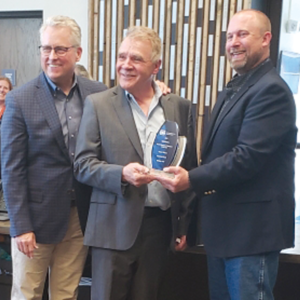A Montana State University alumnus has won the $75K Venture Competition, taking home $25,000 for his business venture. The remaining $50,000 was split between seven other finalists and seven semi-finalists.
The annual competition was open to students, faculty, staff and alumni of Montana State University and the University of Montana. It is hosted by the MSU Jake Jabs College of Business and Entrepreneurship?and the MSU Blackstone LaunchPad. The finalists were from a diverse group of disciplines, including business, engineering, computer science, food science and healthcare.
The winners of the 2023 $75K Venture competition are:
* First place, $25,000: High Proof Razor Co., presented by David Ellig, which designs and manufactures high-quality and innovative shaving razors in Belgrade.
* Second place, $15,000: MatchCoach, presented by Chase Bartlett, a coaching platform that uses artificial intelligence and technology to help tennis players access personalized remote coaching on their gameplay for fractions of the cost of traditional coaching.
* Third place, $10,500: First Nations Foods, presented by James Vallie, which aims to create novel food products using Indigenous cultural food knowledge and modern food science technology
The five other finalists were each awarded $3,500. They are listed in alphabetical order:
* Feedplan, presented by Win Feigle, a subscription-based marketplace platform that connects customers with meal plans from their favorite restaurants.
* Neurofluidic Diagnostics, presented by Zeynep Malkoç and Zach Jewett, an MSU spin-off that offers drug testing environments to detect and monitor the hallmarks of neurodegeneration linked to Alzheimer’s disease and other forms of dementia.
* Scepter Picks, presented by Nicole Matuszynski and Jack Neupert, which is developing high-quality ice climbing picks.
* Seidr, presented by Jay Getten, a clinical decision support system for mental health conditions that is designed to help clinicians effectively triage, assess and treat patients.
* Telepathy Bikes, presented by Calvin Servheen and Matt Lessmeier, which creates mountain bike suspensions that absorb more trail roughness and transmit more rider power than traditional bikes.
The finalists advanced from a semifinal round of 15 competing ventures. The ventures that didn’t make it into the final round received $1,000.
David Ellig, founder of the winning High Proof Razor Co., graduated from MSU in 2015 with a degree in mechanical engineering. He said he was excited to win the money but also appreciated the feedback.
“It’s really cool to get more validation from other people that have been out in the industry that think that this product and this idea has potential and can go somewhere,” he said.
His metal razors are designed to last a lifetime with interchangeable blades. They are made at Ellig’s machine shop in Belgrade.
He said the winnings will help fund a patent and cover some marketing expenses. So far, the company’s only marketing effort has been to provide samples to YouTube personalities to review the razors. Even so, Ellig said, his company has sold more than 1,000 razors since developing the first prototype in 2019.
The diversity of the businesses as well as their sound business plans impressed the judges.
“I was very impressed with the breadth of valid business opportunities as well as the depth of knowledge, preparation, and professionalism of the entrepreneurs at the $75K competition,” Nordhagen said. “The support for the entrepreneurs was also evident through the generosity of the donors who provided the seed money and the coaching that was provided by the LaunchPad team. The prizes are substantial and will really boost these ventures.”
The MSU Jake Jabs College of Business and Entrepreneurship offers four undergraduate options of study – accounting, finance,management and marketing– as well as five minors- accounting, business administration, entrepreneurship and small business management, finance and international business. It also offers a master of professional accountancy degree, master of science in innovation and management, abusiness certificate and entrepreneurship certificate.
MSU’s Blackstone LaunchPad helps MSU students succeed in entrepreneurship and in their careers. Open to students and recent alumni in all majors, LaunchPad provides mentoring, opportunities for participants .



